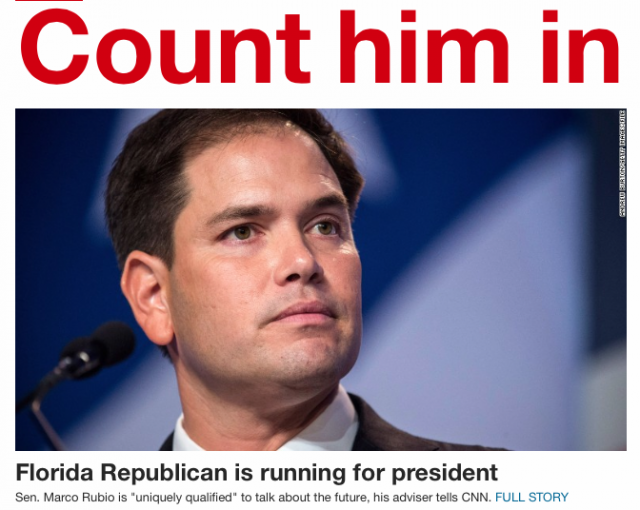Uh Oh, Marco Rubio: How Money Savvy Should A Candidate Be?

What kind of financial acumen do we expect in a presidential candidate? What kind of personal experiences with money would we prefer her to have? If someone running for the highest office in the land has made questionable decisions when it comes to his own debt, loans, and mortgages, does that render him insufficiently savvy to be the leader of the free world — or rather someone who can relate to and understand the problems of the rest of us? Because God knows we’re no angels.
Pundits have been arguing about these questions ever since the Times reported on the “financial struggles” of Senator Marco Rubio.
Among the serious contenders for the presidency, Mr. Rubio stands out for his youth, for his meteoric political rise — and for the persistent doubts about his financial management, to the point that Mitt Romney’s presidential campaign flagged the issue when vetting Mr. Rubio as a possible running mate in 2012, interviews show.
Many of those troubles have played out in an unusually public way, leading even some of his supporters to worry. As he rose in politics, he sometimes intermingled personal and political money — using a state Republican Party credit card years ago to pay for a paving project at his home and for travel to a family reunion, and putting his relatives on campaign payrolls.
Other moves seemed simply unwise: A few weeks ago, he disclosed that he had liquidated a $68,000 retirement account, a move that is widely discouraged by financial experts and that probably cost him about $24,000 in taxes and penalties.
Oof. Yeah. Don’t liquidate your retirement accounts until you absolutely have to because, like, there’s a violent, planet-wide alien invasion and you figure you won’t live to retirement anyway, whereas you need a bazooka and some plutonium ASAP.
The point of the Times piece is not that Rubio has made one or two mistakes with money but that there is a discernible “imprudent” pattern in his behavior:
These were not isolated incidents. A review of the Rubio family’s finances — including many new documents — reveals a series of decisions over the past 15 years that experts called imprudent: significant debts; a penchant to spend heavily on luxury items like the boat and the lease of a $50,000 2015 Audi Q7; a strikingly low savings rate, even when Mr. Rubio was earning large sums; and inattentive accounting that led to years of unpaid local government fees.
Mr. Rubio has acknowledged missteps: using personal credit cards to pay for his campaigns (a bad idea, he said); appointing his wife, Jeanette, as a treasurer of a political action committee (ill advised, he said); and using the party money for the reunion trip (an accident, he said). Mr. Rubio, in his 2012 memoir, “An American Son,” confessed a “lack of bookkeeping skills” and an “imperfect accounting system.”
Ok, so, let’s stipulate that Sen. Rubio is bad with money as a person. Fine. Some of us routinely lose our wallets or our cell phones; others lose our shirts in the stock market. Bad luck, and even situational bad judgment, doesn’t make us bad managers, necessarily, or even subpar leaders. It shouldn’t disqualify us from running for President any more than having so many houses he couldn’t keep track of them disqualified Romney.
Jamelle Bouie at Slate points out the larger and more important issue, which is that Rubio was saved, and remains a viable candidate, because he got help. Yet he’s not interested in making sure other Americans like him can get help too.
Rubio, in other words, had a safety net. And it was powerful. It caught him and his wife when they fell under the weight of their debt, and it gave them time and space to recover. With Braman’s patronage, Rubio could survive his mistakes and make his way to near the top of national politics.
What’s been good for him, it seems, isn’t so great for the American people. Rubio speaks about poverty at almost every opportunity, often well. But his policies would shred the safety net we have for ordinary Americans. …
If there’s hypocrisy in Rubio’s story, it’s right here. For 15 years, he made mistakes with his money. But it never sank him. He got a second chance. And he wants to use that second chance to build a country where Americans without billionaires in their back pockets have fewer shots at bouncing back from their mistakes.
Presidents can be from working class backgrounds or from rich ones; they can juggle student loans as well as missile codes. Ideally though they learn from whatever mistakes they have made and allow that knowledge to make them more empathetic toward average Americans, not less.
Support The Billfold
The Billfold continues to exist thanks to support from our readers. Help us continue to do our work by making a monthly pledge on Patreon or a one-time-only contribution through PayPal.
Comments